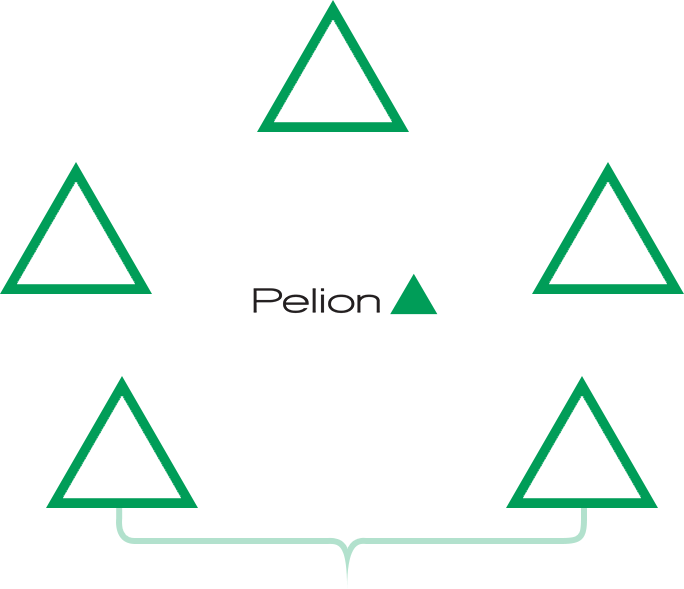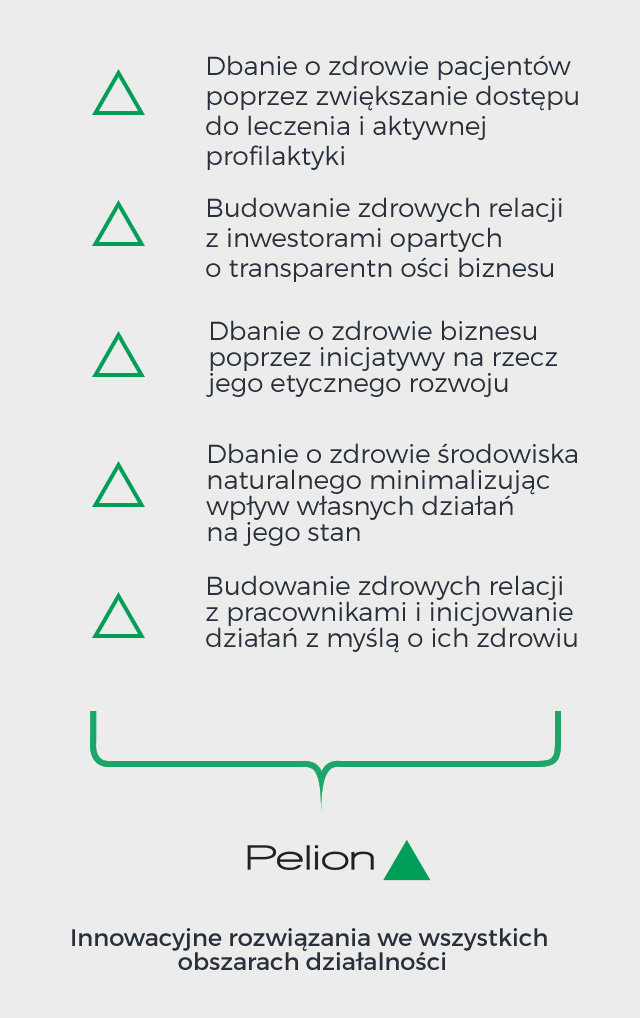CSR Strategy 2012-2015
All Pelion's activities in the CSR area should have a common denominator
HEALTH
– understood both literally (human health/society's health) and figuratively (as healthy business practices)
While these efforts should engage all stakeholders, they should always be driven by Pelion's employees − our key capital
All CSR initiatives should be designed to look to the future
,
(with tradition as their starting point)
Key areas of action


Innovative solutions across all business areas

Our goals: PATIENTS − our primary stakeholders
by improving access to medical treatment, active disease
prevention, tackling poverty and social inequality

DOZ Łódź Marathon in partnership with PZU − involving all Pelion companies
Continuing patient-centred programmes
Knowledge-sharing initiatives via a uniform platform
Protecting Human Rights
Our goals: Employees
and taking initiatives to promote their health
Introducing a Group-wide HR policy
Developing Pelion's
code of ethics
Employee volunteering
(satisfaction from being able to reconcile work with self-fulfilment through voluntary service)
Creating conditions for employees to communicate their expectations
Intra-Group sharing of best practice
In relations with employees, giving priority to health-focused initiatives.
Our goals: Local communities
with local communities by taking relevant initiatives
Urtica for Children
Bringing more companies to join in Pelion initiatives
National heritage − cultivating pharmaceutical traditions through pharmacy museums (Łódź, Lublin), running historical pharmacies and publishing
Our goals: Business partners
Developing a code of ethics
for Pelion and its business partners
Imposing compliance with the UN Global Compact's
10 principles and Pelion's code of ethics on business partners
Ensuring that subcontractors comply with the
Pelion Healthcare Group Code of Ethics
Forging stronger ties with business partners
Training employees in business ethics
Seeking synergies and balance between economic,
environmental and social aspects of our business
Laying down special requirements for providers
of transport/logistics services taking account of the
need to reduce carbon emissions (compliance with the Global Compact's principles)
Our goals: Investors
Launching CSR projects for existing or prospective stock-market investors
Investing in the future, e.g. by deploying innovative IR channels
Modern website
Demonstrating to investors that passion is what all Pelion companies have in common
Integrated reporting/ Respect Index
Our goals: Pharmaceutical and medical sector, B2B
Advancing the idea of promotion of the highest standards in healthcare in the context of changes affecting the pharmaceutical industry
Extending our initiatives to legislators (education in the context of proposed legislative changes)
Advancing the idea of promotion of the highest standards in healthcare in the context of changes affecting the pharmaceutical industry
Setting up a uniform platform for all knowledge-sharing initiatives
Taking initiatives based on knowledge sharing to effectively operate in the pharmaceutical industry, in compliance with law and with due regard to Patients' needs
Continuing our educational initiatives to provide business management support to pharmacists;
taking into account the real needs of this professional group and creating tools to understand such needs
Developing a uniform communication system for B2B clients
Building and fostering relations with the academic community.
Our goals: Sustainable development/ the environment
Direct environmental aspects, which can be controlled by changing our everyday behaviours at every stage of our operations:
Consumption of energy for heating, lighting, and use of equipment, such as computers, household appliances, etc.
Withdrawal and consumption of water
Consumption of paper attributable to contracts, settlements, orders and invoices
Consumption of fuels by the corporate car fleet
Generation of municipal and business-related waste
Indirect environmental aspects, which cannot be fully controlled by Pelion:
Relations with third parties, which the Company can influence only to a limited extent
Legal regulations and administrative decisions
Establishing relations with various providers of maintenance, waste collection, transport, cleaning and other services.
These relations entail indirect environmental impacts of various intensity.
Actions in key areas involving environmental risks:
- waste management
- collection and recycling of drugs, waste cardboard, plastic film and aluminium
- collection of waste paper, toners, batteries and bottle caps
- fuel combustion = ecodriving, fleet replacement
Monitoring of water, wastewater and energy consumption
Taking sustainable development/environment protection initiatives in these areas
Setting specific goals and introducing a mechanism that would make Group companies compete in their pursuit
Involving employees in the process of identifying areas where measures can be taken to reduce the volume of/collect waste/pollutants.

Created by John Pitcher